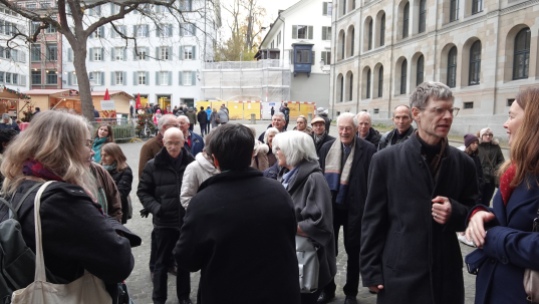On Saturday 23rd November, the BELK organized a special study day for which Lutheran Churches throughout Switzerland came together in Zurich for a day of learning about the life and work of Ulrich Zwingli — especially around the Reformation. The keynote presentation was provided by Catherine McMillan, Pfarrerin Kirchenkreis Schwerzenbach.
Here are the English visuals accompanying Catherine’s bi-lingual presentation.
The day continued with a guided tour of the Grossmünster, the church where Zwingli served as pastor. 2019 marks the 500th anniversary of the start of his ministry in the city.

Historical significance (Wikipedia)
Zwingli on the bronze doors by Otto Münch (1935)
Huldrych Zwingli initiated the Swiss-German Reformation in Switzerland from his pastoral office at the Grossmünster, starting in 1520.
Zwingli won a series of debates presided over by the magistrate in 1523 which ultimately led local civil authorities to sanction the severance of the church from the papacy.

The reforms initiated by Zwingli and continued by his successor, Heinrich Bullinger, account for the plain interior of the church.
The iconoclastic reformers removed the organ and religious statuary in 1524.
These changes, accompanied by abandonment of Lent, replacement of the Mass, disavowal of celibacy, eating meat on fast days, replacement of the lectionary with a seven-year New Testament cycle, a ban on church music, and other significant reforms make this church one of the most important sites in the history of the reformation and the birthplace of the Swiss-German reformation.
His life’s work made him world famous: within a few years, Huldrych Zwingli, the main proponent of the Protestant Reformation in Switzerland, turned the entire city of Zurich and a firmly established canon of values upside down. With razor-sharp intellect, he dissected the religious and social system, denounced abuses and was not afraid of taking issue with the most powerful people of his time.
Text: Swiss Films









